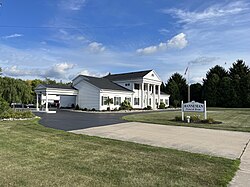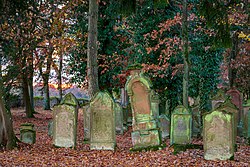
Delving into one's family history can be a fascinating journey, uncovering stories of ancestors, their lives, and their legacies. While birth, marriage, and death records are commonly utilized in genealogical research, another valuable resource often overlooked is funeral home records. So, whether you're a seasoned researcher or a curious novice, consider exploring funeral home records as a vital resource in unlocking the mysteries of your family history.
Research your ancestors on MyHeritage
What are funeral home records?
Funeral home records encompass a variety of documents created by funeral directors and establishments during the funeral planning and burial process.[1] These records typically include details about the deceased individual, their family members, the funeral arrangements, and often provide insights into the circumstances surrounding their death. Funeral home records can vary in content and format but commonly include:
- Death certificates: These official documents record essential information about the deceased individual, including their full name, date and place of birth, date and place of death, cause of death, and details about their parents. This biographical data can help genealogists fill in missing pieces of the family puzzle and trace ancestral lines more accurately.
- Funeral registers: These registers document the services provided by the funeral home, such as the date of the funeral, the name of the deceased, the names of family members, and the burial location. These details provide insights into family traditions, religious affiliations, and cultural practices.
- Burial permits: Issued by local authorities, burial permits authorize the burial or cremation of the deceased individual and often contain details about the location and date of interment.
- Obituaries and death notices: Many funeral homes compile obituaries or death notices to announce the passing of an individual in local newspapers. These documents often provide biographical information about the deceased, details about their family members, and information about the funeral arrangements.
- Correspondence and Receipts: Funeral home records may also include correspondence between the funeral director and the family, as well as receipts for services rendered and expenses incurred during the funeral process. These additional documents can provide further context and detail about the circumstances surrounding the individual's death and burial.
How to find funeral home records

Now that we understand the value of funeral home records in genealogy, let's explore the best ways to uncover these hidden gems:
- Identify the Funeral Home: Start by determining which funeral home handled the arrangements for your ancestor's funeral. This information can often be found in obituaries, death certificates, or family lore. If you're unsure, consider reaching out to other family members who may have knowledge of the funeral arrangements.
- Contact the funeral Home: Reach out to the funeral home directly to inquire about their record-keeping practices and the availability of historical records. Funeral homes may keep records for a certain period, so it's essential to inquire about the timeframe you're interested in. This information can often be found in obituaries, death certificates, or family records. If you're unsure, consider reaching out to other family members who may have knowledge of the funeral arrangements.
- Search online databases: Several online platforms specialize in funeral home records and obituaries. Websites like MyHeritage, billiongraves.com, and Legacy.com offer searchable databases of obituaries and death notices, which may contain valuable information about your ancestor's funeral arrangements.
- Visit Local Archives and Libraries: Local archives, historical societies, and libraries may hold collections of funeral home records, especially for older records that have been donated or transferred from defunct funeral homes. Visit these institutions in person or inquire about their collections online or over the phone.
- Explore Newspaper Archives: Historical newspapers often published obituaries and death notices, which may contain details about funeral arrangements and services. Search digitized newspaper archives online or visit local libraries and archives to access physical copies of newspapers.
Are all funeral homes the same?
While funeral homes share the common purpose of providing funeral services and assisting families with the burial or cremation process, not all funeral homes are the same. Variations in size, services offered, record-keeping practices, and longevity in the community can impact the availability and accessibility of funeral home records. Larger, well-established funeral homes may have more extensive record collections and a higher likelihood of preserving historical records. However, even smaller funeral homes may keep meticulous records that can provide valuable insights for genealogical research. Ultimately, it's essential to explore a variety of sources and approaches to locate funeral home records for your genealogical research needs.
Funeral home records: challenges and strategies
Searching for funeral home records can present several challenges for genealogical researchers. Here are some common challenges and strategies to combat them:
- Limited availability: Funeral home records may not always be readily accessible or available to the public. Some funeral homes may have closed down or transferred their records to other institutions, making them difficult to locate.
Combat: Reach out to local libraries, historical societies, and archives in the area where your ancestor lived. They may have collected or received funeral home records from defunct funeral homes. Additionally, try contacting other nearby funeral homes or the local government office responsible for vital records, as they may have information on where to access older records. - Privacy restrictions: Funeral home records may contain sensitive information about the deceased and their family members, leading to privacy restrictions on accessing certain records.
Combat: Understand the privacy laws and regulations governing access to funeral home records in the jurisdiction where your ancestor lived. Some records may be restricted to immediate family members or have limited access due to privacy concerns. Consider obtaining permission from surviving family members or legal representatives to access restricted records. - Poor record keeping: Funeral home records may have been poorly maintained, lost, or damaged over time, making them difficult to locate or decipher.
Combat: Cast a wide net and search multiple sources for funeral home records, including online databases, local archives, libraries, and historical societies. Be prepared to cross-reference information from other sources, such as death certificates, obituaries, and newspaper records, to corroborate details found in funeral home records. Additionally, consider hiring a professional genealogist with experience in navigating challenging record sets. - Incomplete or inconsistent information: Funeral home records may contain incomplete or inconsistent information, such as misspelled names, incorrect dates, or missing details, which can make it challenging to accurately identify ancestors.
Combat: Exercise patience and diligence when analyzing funeral home records and be prepared to cross-reference information with other sources to verify accuracy. Look for alternative spellings of surnames or variations of given names. Compare information found in funeral home records with other records, such as census records, marriage records, and newspaper obituaries, to ensure consistency and accuracy. - Costs and fees: Obtaining access to funeral home records may incur costs or fees, especially if you need to request copies of records or hire professional assistance.
Combat: Research the costs associated with accessing funeral home records in advance and budget accordingly. Some institutions may offer free or low-cost access to certain records, while others may charge a fee for copying or retrieving records. Consider leveraging free online resources and databases before investing in paid services. Additionally, reach out to local genealogical societies or volunteer groups for assistance and guidance on accessing records at minimal cost.
See also
Explore more about funeral home records
- Death, Burial, Cemetery & Obituaries records colletion at MyHeritage. Death certificates represent one of the key primary sources for family information, typically being issued within days of a death and having many details about a persons' life. Frequently, they contain age, birthplace, parents' names and birthplaces and the cause of death.
- Funeral Homes and Family History: They're Dying to Meet You! webinar at Legacy Family Tree Webinars
- Newspaper and Funeral Home Obituaries at MyHeritage. The collection includes obituary notices from newspapers and funeral homes dating back to the 1930s. Records typically include the name of the individual, date of birth, date of death, and the place of burial.
- California, San Francisco Area Funeral Home Records, 1835-1931 at MyHeritage. This project was indexed in partnership with the California Genealogical Society and Library. Name index and images of funeral home records from the Halsted N. Gray - Carew & English Mortuary Collection, located at the San Francisco Public Library.
- Michigan, Macomb County Funerals at MyHeritage. This collection contains records of individuals who died and their funeral service was conducted in various funeral homes in Macomb County, Michigan, United States. Records typically include the name of the deceased and the funeral home in which the funeral took place.
- Funeral Homes and Family History: They're Dying to Meet You! on the Legacy Family Tree Webinars. Most genealogists know to look in a cemetery to find their ancestors, but what about the funeral home? Funeral home records can provide loads of genealogically rich information. This presentation will teach participants what types of records are typically found in funeral homes, how to locate these resources online and "in the field", as well as provide real life examples of how to search for ancillary clues in funeral home records.
- Separate Even in Death – Black Funerals and Cemeteries on the Legacy Family Tree Webinars. Segregation extended into death for African Americans, especially for those in the Southern United States. What led to the development of separate funeral homes and burial grounds? This presentation looks at burial practices for African-Americans from the 16th to the 20th century.
- Vital Records: How to Find Birth, Marriage & Death Records on the MyHeritage Knowledge Base
- How to Locate an Obituary for Your U.S. Ancestor on the MyHeritage Knowledge Base
- Documenting Cemeteries with BillionGraves on the MyHeritage Knowledge Base
- Amazing Ways to Use Death Records for Family History Research on the MyHeritage Blog
- Buried Alive! Families that Lived to Tell the Tale on the MyHeritage Blog
References
- ↑ Mortuary Records. The Ancestor Hunt


